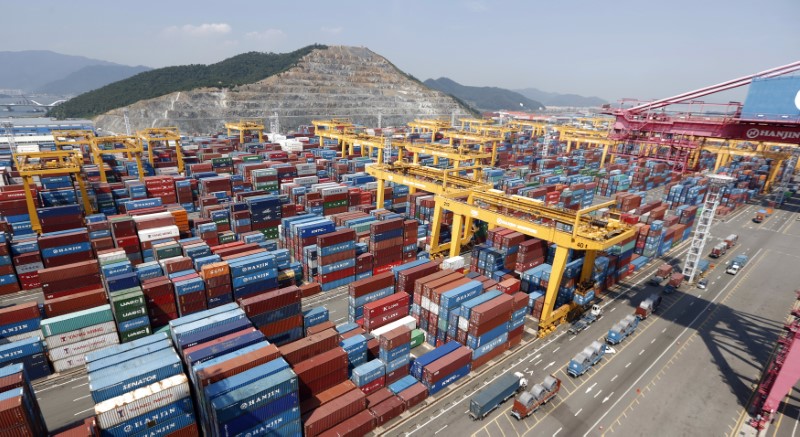By Hayoung Choi
SEOUL - South Korea's exports fell the most in over two years in September, but analysts chalked up the decline to fewer working days and said global demand for the country's goods still seems strong despite mounting Sino-U.S. trade tensions.
Indeed, South Korea's average exports per working day increased last month. And an earlier preliminary reading had pointed to solid double-digit export growth in the first few weeks of September before long holidays kicked in.
The rate of decline in the headline export reading was the sharpest since July 2016, and undershot a Reuters survey, where 11 economists forecast a 5.7 percent decrease from a year earlier.
By value, exports stood at $50.6 billion, way below August's $51.2 billion, preliminary data showed on Monday. By volume, they fell 16.2 percent.
Despite worries that the deepening dispute between Washington and Beijing will cause collateral damage for China's export-reliant neighbours, South Korea's exports to China rose 7.8 percent in September, expanding for the 23rd month in a row.
On the other hand, exports to the United States dropped 11.8 percent as sales of petroleum goods declined.
South Korea's overseas sales of memory chips and petroleum products increased 28.3 percent and 13.5 percent, respectively, despite concerns that a so-called "super-cycle" for memory chips has peaked.
"The short-term concern (about export risks) is limited since chip sales to China are strong," said Chun Kyu-yeon, an analyst at Hana Financial Investment.
"Still, the impact from the trade conflict will be inevitable due to South Korean exports' considerable dependency on U.S. and Chinese markets."
Imports fell 2.1 percent to $40.8 billion, also underperforming the survey that predicted 3.1 percent growth. That led to a preliminary trade surplus of $9.7 billion, up from $6.9 billion in August.
The trade ministry said global manufacturing will remain upbeat thanks to the U.S. and EU countries, which will be a favourable factor for South Korean exports.
"Higher export prices due to rising oil prices will also help the export in the second half of this year," the statement reads.
"However, extension of trade conflict between Washington and Beijing and growing volatility following rate hike of the U.S. are downside pressure of exports."
Average exports per working day rose to $2.6 billion, from $2.1 billion in August.
There were only 19.5 working days in September this year because of the Chuseok holiday from Sept. 24 to 26, four fewer days than last year.
South Korean exports from January to September grew 4.7 percent in annual terms.

South Korea's factory activity rebounded in September, according to Nikkei/Markit purchasing managers' index (PMI), but the pick up was supported by domestic orders as orders from China and Japan declined, which could overshadow the export outlook.